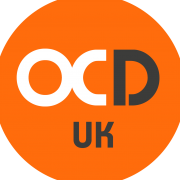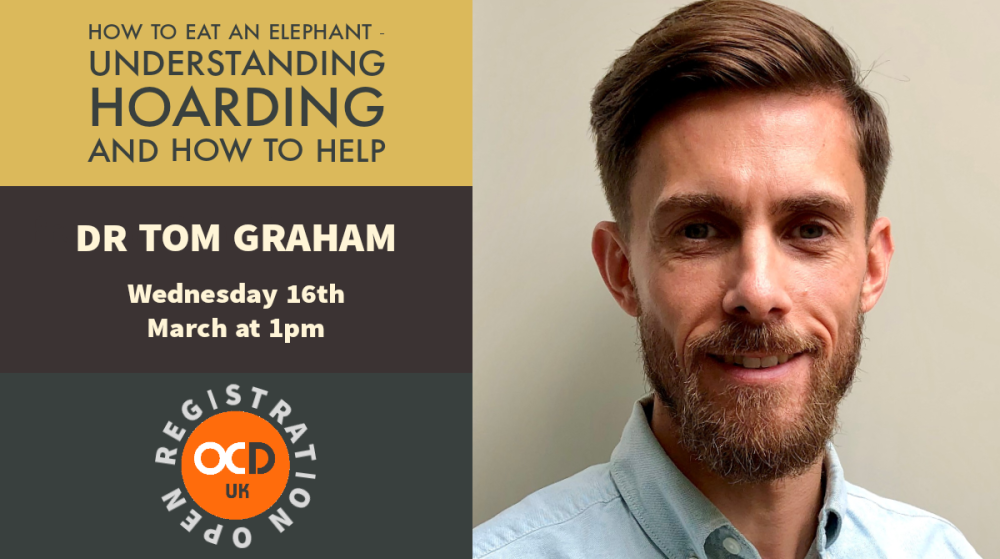-
Posts
369 -
Joined
Content Type
Profiles
Events
Forums
Store
Everything posted by Gemma@OCDUK
-

My daughter is struggling with ocd around death
Gemma@OCDUK replied to Jcb's topic in Family, Friends and Carers (FFC)
Hi Jcb, I'm really sorry to hear how much your daughter is struggling at the moment. It's good to hear she is on the waiting list for Cognitive Behavioural Therapy but understand it's hard to know what to do in the meantime. The types of worries and behaviours that you're describing are really common for those with OCD and that type of thinking is often called magical thinking. That's where there is no logical step between the worry, which is something bad will happen, and the behaviour, like switching lights on or off and getting dressed. While your daughter is waiting for therapy it might be helpful for her to look into a self-help book like Break Free from OCD, which takes you through what OCD is, how it keeps going and how to challenge it with CBT. It can be great for loved ones to read too. We also have a couple of presentations from our online conference in 2020 that you might find helpful in understanding OCD and how to help someone with it. There’s this one by Lauren Callaghan https://www.ocduk.org/conference/conferences-across-the-uk/2020-virtual/conference-map/family/helping-family-member-with-ocd/ and another by Mark Freeston https://www.ocduk.org/conference/conferences-across-the-uk/2020-virtual/conference-map/main/understanding-why-people-with-ocd-do-what-they-do/ Gemma -
Hi Melsmum, This is common for those with OCD. It's essentially just intrusive thoughts/images, but where a person doubts if the thought happened. A therapist ideally would look at the importance a person is placing on their thoughts and feelings and how questioning and thinking about a thought/doubt is making the problem worse. Gemma
-
Hi Summer, SSRIs act on the neurotransmitter called Serotonin, making it more readily available in the synapse between nerve cells. How that effects the individual varies considerably from person to person. Some people notice a reduction in thoughts, whereas others notice a reduction in anxiety, some people notice little change. It really is a try it and see how it goes situation Gemma
-

Pregnant with OCD. Need help
Gemma@OCDUK replied to LaurenB's topic in Obsessive-Compulsive Disorder (OCD)
Hi Lauren B, I'm really sorry to hear that you're finding things so hard at the moment, especially during a time when you want to be looking forward to your new baby. It's common for OCD to come about during and after pregnancy so please know that you are not alone. Many people with OCD have an inflated responsibility, so the responsibility of carrying your own child can trigger worries about what you can do to prevent harm. A great self-help book is Break Free from OCD, if you would like to understand more about how responsibility plays a role in OCD. I'm not sure about the advice that ERP isn't right to do in pregnancy, in fact I believe you can make a case for it's helpfulness. We have a presentation that you might find helpful that does talk about this from our online conference. You can watch it here https://www.ocduk.org/conference/conferences-across-the-uk/2021-virtual/breakout/working-with-perinatal-ocd-in-a-pandemic/ Gemma -
Hi Tash, I'm really sorry to hear how tough a time you've had. I think many people will identify with what you've said. When you are bombarded with intrusive thoughts it can make feelings very acute and the compulsions you do in response can take up all of your time. Have you ever looked into therapy as a treatment option? Gemma
-

OCD-UK Webinar Series
Gemma@OCDUK replied to Gemma@OCDUK's topic in Obsessive-Compulsive Disorder (OCD)
Hi Angst, I'm sorry to hear that you won't be able to attend but fortunately the presentation will be recorded and will be available to non-members at the end of April on our website That's a difficult question to answer, was that something that you wanted to ask Tom? Gemma -
Hi Keyboard Worrier, As IESO is an IAPT service, you may be able to use your Right to Choose https://www.ocduk.org/overcoming-ocd/accessing-ocd-treatment/accessing-ocd-treatment-through-the-nhs/right-to-choose/ via your GP to access IESO. It could be worth a try if you're struggling to find suitable support. Gemma
-

OCD-UK Webinar Series
Gemma@OCDUK replied to Gemma@OCDUK's topic in Obsessive-Compulsive Disorder (OCD)
Thank you everyone so far for your suggestions We do have this presentation "Gut feeling: The link between your gut health, your mental health, and your anxiety" that you might find helpful. You can view it here https://www.ocduk.org/conference/conferences-across-the-uk/2020-virtual/conference-map/wellbeing/gut-feeling/ Gemma -

OCD-UK Webinar Series
Gemma@OCDUK replied to Gemma@OCDUK's topic in Obsessive-Compulsive Disorder (OCD)
Hi Lily Sheila, Thank you for both suggestions, we will definitely consider them Gemma -

Questions about therapy
Gemma@OCDUK replied to Mcbehan's topic in Obsessive-Compulsive Disorder (OCD)
Hi Mcbehan, The things that are worrying you bother many people before they reach out for help, so please know that you are not alone. It's most likely that what you explain to the mental health professionals, they will have heard many times before, especially when we know that sexual/violent intrusive thoughts are very common for those with OCD (and in the general public too!). The evidence of this being OCD is that you don't want to have these thoughts at all, in fact trying to get rid of them will most likely be the thing driving your problem. Perhaps you could try to work out what you feel would be the easier things to explain, until you feel a little more confident during the assessment. You can also emphasise that you dislike the thoughts and want them to go away. There is an excellent self-help book called OCD, Anxiety and Related Depression https://www.ocduk.org/shop/ocd-anxiety-related-depression/ which is written by a sufferer Adam Shaw and his therapist. Adam struggled with violent thoughts and his therapist helped him towards recovery. It might also be a helpful tool to explain what you're experiencing to loved ones. There is also Adam Radomsky's fantastic presentation on the nature of thoughts that could help you further here https://www.ocduk.org/conference/conferences-across-the-uk/2021-virtual/main/its-not-the-thought-that-counts/ Gemma -

OCD-UK Webinar Series
Gemma@OCDUK replied to Gemma@OCDUK's topic in Obsessive-Compulsive Disorder (OCD)
Hi everyone, Please feel free to share any webinars you would like to see, we are always open to hearing ideas Gemma -
We are hosting a series of webinars looking at OCD in depth and its related disorders. Our first one is How to eat an elephant - Understanding hoarding and how to help. Join Dr Tom Graham on Wednesday 16th March at 1pm. Here is a brief description - We all love our stuff. Everyone has possessions that mean something to them that they would not want to part with, but for some people it can be especially difficult to discard things, and items can start to pile up. This can lead to problems and can get in the way of a person living a safe and happy life in their home. Excessive collecting and clutter can cause distress and upset for those struggling with hoarding, and for those around and them. This 1-hour talk will explain a little about hoarding disorder as a mental health problem, what it is (and isn’t), why people might struggle with this condition, and how to help tackle it. How do you eat an elephant? One bite at a time. If you would like to join us at the webinar, you can register here https://www.ocduk.org/webinar-series/how-to-eat-an-elephant-understanding-hoarding-and-how-to-help/ See you then!
-
Hi Chihuahua, Could you outline your situation in an email to support@ocduk.org to see what next step you can take? Gemma
-
Hi Rach, Obsessions vary and can come in the form of urges, which is probably what you're experiencing. So your obsessions are still present, but it's just more of a feeling to do something rather than thoughts. You then have the compulsions, like turning cans around, and then the worry if you don't do your compulsion, like something bad happening. I hope this is helpful, Gemma
-
Hi Catherine, That's fantastic. I know it will be very difficult given the resources are in English, but if you can take anything from them at all, then that will be a fantastic step forward I'm sorry that you haven't found comfort from your friends when you have spoken about your problems, that must have been really difficult for you. It's OK for you to write how you feel here, I'm sure many people will relate to you. There are lovely supportive people on here and I hope that they can support you through this. Gemma
-
Hi Catherine, I'm sorry that you're struggling so much. I know that the groups were really helpful to you. Hopefully you will find the forums a supportive place to be and get support. Have you looked into any of the self-help materials we recommended? It's natural to have mood changes as OCD can be a lot to tackle on your own, so please be kind to yourself and well done for reaching out here. Gemma
-

Can someone offer me help or guidance
Gemma@OCDUK replied to Lewis96's topic in Obsessive-Compulsive Disorder (OCD)
Hi Lewis, I'm sorry to hear that you're struggling at the moment. I can understand how someone getting an electric shock from something you made would trigger OCD worries and doubts and it sounds like you've gone to great effort to ensure no one else will be affected. You asked what exactly the intrusive thoughts are and I would say for you they will probably be doubts like ''what if someone else gets another shock'', ''what if I could do more?''. These will then lead to feelings of anxiety and fears about coping if the worst might happen. Compulsions might be thinking this over and over, checking things, and may include some of the communication with those who bought the product (as you went to great lengths to make people aware). So although all of these worries have come about because of something that has actually happened, that doesn't mean it's not OCD. Have you looked into accessing any treatment? Gemma -
Hi Jo, I'm sorry to hear that your daughter is struggling so much. I'm assuming the therapist your daughter is seeing is a private CBT therapist, so if she feels like therapy isn't working for her then it could be good to look into a different therapist if this is possible. It's really common for people with OCD to have two or three different therapists before they find one with the right expertise or approach to really help them tackle the OCD. In terms of medication, people's experiences vary massively and the best step would be to discuss options with your daughter's GP if you feel she can't wait till her psychiatrist appointment. You will be able to raise any concerns you might have and go from there. Medication can be helpful in taking the edge off anxiety, meaning CBT can be easier to engage with. Gemma
-
Hi Manny, That sounds like it could be good step then. It's important that therapy addresses the main problem going on at the moment, whether that be bipolar disorder or another co-occurring problem. This can be because other mental health conditions can interfere with your ability to engage with CBT, so need looked at first. As Angst says, the cognitive side is where you consider what your problem is and how it keeps going. Sometimes if we don't understand how OCD works and why we need to change how we react, it can make doing the behavioural side (exposure exercises) much harder to do. Gemma
-

What is driving my Contamination OCD?!
Gemma@OCDUK replied to Lorna02's topic in Obsessive-Compulsive Disorder (OCD)
Hi Lorna, It sounds like your therapist is too focussed on there being an intrusive thought, which isn't always the case. An obsession is a recurrent persistent thought, urge, image or doubt that is experienced as intrusive and unwanted and causes distress, so in other words it is not always a thought. Sometimes people go to therapy and they do rituals and have no idea why, in some cases it makes sense to not do the behaviour to find out what bothers them, but this might not help in others where what they fear is the feelings that they get. It's possible that what you fear is that the feelings you get won't ever go away, or that you've lost control in some way, but most importantly, all you need to know is that you do compulsions because of feelings. This is a lot more common than you might think and it just happens to be that cleaning is your solution. Some people who do compulsions because of feelings order things in their home, others tap or count things. The aim of CBT is for you to learn that the cleaning that is your solution, has actually become the problem, and that there are much more helpful ways to deal with these feelings that don't involve cleaning Gemma -
Hi Manny, I'm sorry to hear that you have been told this. I suppose it depends on why they feel you are not stable enough, is it because of OCD or some other reason? If it is because of OCD, then surely they are proposing another solution. I know that many people need more focus on the cognitive side of CBT before they feel ready to do exposure exercises. Are your therapist and psychiatrist through the NHS? Gemma
-

Feel like I’m not being listened too
Gemma@OCDUK replied to Summer9173's topic in Obsessive-Compulsive Disorder (OCD)
Hi Summer, I am really pleased to hear that they have listened to your choice. Good luck with your therapy Gemma -

BBC - OCD three moments that changed my life
Gemma@OCDUK replied to Lollipop's topic in OCD Awareness & OCD in the media
Fantastic video, well done Duke ????


